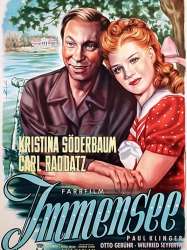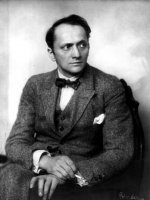Wolfgang Zeller is a Original Music Composer Allemand born on 12 september 1893

Wolfgang Friedrich Zeller (né le 12 septembre 1893 à Biesenrode, mort le 11 janvier 1967 à Berlin) est un compositeur allemand de musique de film.
Après la guerre, il écrit de grandes compositions pour orchestre, de la musique de chambre et des chansons. Il entre comme violoniste dans l'orchestre du Volksbühne Berlin et est de 1921 à 1929 compositeur et chef d'orchestre de la musique de scène.
Grâce à la réalisatrice Lotte Reiniger, il arrive à la composition de musique de film et écrit pour le film d'animation Les Aventures du prince Ahmed en 1926. Zeller devient bientôt l'un des compositeurs de films les plus demandés et les plus joués de son temps.
Bien qu'il ne soit pas adhérent du NSDAP, Zeller écrit la musique aussi de films de propagande pendant le Troisième Reich. En 1938, Oswald Lehnich, président de la Chambre du film du Reich, suggère son nom pour la Chambre de la culture du Reich. En 1940, il écrit une musique de scène pour l'adaptation du Songe d'une nuit d'été de William Shakespeare en substitut de la célèbre musique de scène de Felix Mendelssohn.
Après la Seconde Guerre mondiale, Zeller est Kapellmeister du Theater am Kurfürstendamm. Il continue à être compositeur pour le cinéma, pour des films antifascistes comme Mariage dans l'ombre ou Morituri. Sa dernière œuvre est pour le documentaire Serengeti ne doit pas mourir en 1959.
Zeller est membre de la Conférence chrétienne pour la Paix.
Source : Wikidata
Wolfgang Zeller

- Infos
- Photos
- Best films
- Family
- Characters
- Awards
Biography
Wolfgang Zeller est le fils d'un pasteur. À huit ans, il commence à apprendre le violon puis plus tard à composer. Après l'abitur à Potsdam, il prend des cours à Berlin auprès du violoniste Felix Berger et du compositeur Jean Paul Ertel. Il participe à la Première Guerre mondiale d'octobre 1914 à novembre 1918.Après la guerre, il écrit de grandes compositions pour orchestre, de la musique de chambre et des chansons. Il entre comme violoniste dans l'orchestre du Volksbühne Berlin et est de 1921 à 1929 compositeur et chef d'orchestre de la musique de scène.
Grâce à la réalisatrice Lotte Reiniger, il arrive à la composition de musique de film et écrit pour le film d'animation Les Aventures du prince Ahmed en 1926. Zeller devient bientôt l'un des compositeurs de films les plus demandés et les plus joués de son temps.
Bien qu'il ne soit pas adhérent du NSDAP, Zeller écrit la musique aussi de films de propagande pendant le Troisième Reich. En 1938, Oswald Lehnich, président de la Chambre du film du Reich, suggère son nom pour la Chambre de la culture du Reich. En 1940, il écrit une musique de scène pour l'adaptation du Songe d'une nuit d'été de William Shakespeare en substitut de la célèbre musique de scène de Felix Mendelssohn.
Après la Seconde Guerre mondiale, Zeller est Kapellmeister du Theater am Kurfürstendamm. Il continue à être compositeur pour le cinéma, pour des films antifascistes comme Mariage dans l'ombre ou Morituri. Sa dernière œuvre est pour le documentaire Serengeti ne doit pas mourir en 1959.
Zeller est membre de la Conférence chrétienne pour la Paix.
Usually with
Filmography of Wolfgang Zeller (23 films)
Sound

Serengeti Shall Not Die (1959)
, 1h25Directed by Bernhard Grzimek
Genres Documentary
Themes Films set in Africa, Films about animals, Environmental films, Documentaire animalier, Documentary films about environmental issues, Documentary films about nature
Actors Bernhard Grzimek
Roles Original Music Composer
Rating77%





Le documentaire est un plaidoyer pour l'importance de la préservation de l'écosystème du Parc national du Serengeti en Tanzanie, rendu célèbre dans le monde entier grâce à Bernhard Grzimek.

Shadows in the Night (1950)
, 1h22Directed by Eugen York
Genres Drama
Actors Hilde Krahl, Willy Fritsch, Carl Raddatz, Carl-Heinz Schroth, Ursula Herking, Inge Meysel
Roles Music
Rating69%






The Last Night (1949)
, 1h25Directed by Eugen York
Genres Drama, War, Romance
Themes Théâtre, Films based on plays
Actors Sybille Schmitz, Margarete Haagen, Carl-Heinz Schroth, Peter Mosbacher, Josef Sieber, Franz Schafheitlin
Roles Music
Rating75%






Morituri (1948)
, 1h28Directed by Eugen York
Genres Drama, War
Themes Political films
Actors Winnie Markus, Hilde Körber, Lotte Koch, Josef Sieber, Carl-Heinz Schroth, Erich Dunskus
Roles Original Music Composer
Rating68%





As the end of the Second World War approaches and the Soviet Red Army is advancing, a group of concentration camp inmates is helped to escape by a Polish doctor. They hide in a wood where they meet other fugitives, who have been there for months, constantly in fear of being discovered. Out of fear of the German army patrols, they do not dare to leave the forest, even as the food supplies run low. The Polish doctor blows up a bridge, attracting the German troops' attention to the forest. The soldiers come perilously close to the hidden fugitives, but in the last moment have to retreat before the approaching Red Army units.

Marriage in the Shadows (1947)
, 1h44Directed by Kurt Maetzig
Genres Drama
Themes Films about religion, Political films, Films about Jews and Judaism
Actors Ilse Steppat, Claus Holm, Hans Leibelt, Karl Hellmer, Willy Prager
Roles Original Music Composer
Rating71%





Actor Hans Wieland refuses to divorce his actress wife, Elisabeth, who is Jewish, even as extreme pressure is applied on him by the Nazi authorities. He even takes her to a premiere of one of his films where she is unwittingly introduced to a high Nazi Party official. Upon later discovering that the charming woman at the premiere was in fact Jewish, he orders her arrest. Hans Wieland is given an ultimatum by his former friend Herbert Blohm, now a Nazi official at the Reichskulturministerium (culture ministry), to save himself by divorcing his wife. Knowing that his wife will die in a concentration camp, Hans Wieland returns home and they drink poison in coffee whilst reciting the closing scene of Friedrich Schiller's tragic play Kabale und Liebe together.

Immensee (1943)
, 1h28Directed by Veit Harlan
Genres Drama, Romance
Themes Films about music and musicians
Actors Kristina Söderbaum, Carl Raddatz, Otto Gebühr, Germana Paolieri, Vadim Glowna, Max Gülstorff
Roles Music
Rating64%





Elisabeth (Kristina Söderbaum) falls in love with Reinhardt (Carl Raddatz), but he leaves their native village to study music, travel the world and build his career as a composer. His most important compositions are inspired by his love for her, Twelve Songs of Elisabeth and Seerosen (water lilies, the couple's special flower), but after she visits him on the day of his final examination at the conservatoire and finds a strange woman asleep in his bed, Elisabeth marries Erich (Paul Klinger), the wealthy heir to the estate of Immensee. Reinhardt returns to win her back, and Erich releases her, telling her that all that he wants is for her to be happy. This causes Elisabeth to realise what love really means and she tells Erich for the first time that she loves him, and remains with him. In the frame story, many years have passed, Erich is dead and Elisabeth and Reinhardt, who is now a renowned composer, meet for tea at his hotel after a performance of his Seerosen; at the end of the film, she tells him she will remain true to Erich and to Immensee, and he leaves for the last time.

Andreas Schlüter (1942)
, 1h51Directed by Herbert Maisch
Origin German
Genres Drama, Biography
Actors Heinrich George, Olga Tschechowa, Mila Kopp, Ernst Fritz Fürbringer, Theodor Loos, Dorothea Wieck
Roles Music
Rating70%





L'Électeur de Brandebourg Frédéric III veut que sa résidence à Berlin soit un monument remarquable parmi les plus grands. Les dessins représentatifs mettent en avant par leur aspect la magnificence de Frédéric. Mais les intrigues de la Cour rendent difficile le choix d'un artiste qui puisse répondre aux désirs du souverain. Finalement on prend Andreas Schlüter après qu'il a présenté une statue équestre de l'Électeur. Frédéric en est très satisfait et fait de lui son architecte de cour. La première mission sera d'agrandir le château de Berlin et de l'orner grandement.

Süss, the Jew (1940)
, 1h36Directed by Veit Harlan
Genres Drama, Historical
Themes Politique, Films about religion, Political films, Films about capital punishment, Films about Jews and Judaism
Actors Ferdinand Marian, Werner Krauss, Heinrich George, Kristina Söderbaum, Eugen Gottlob Klöpfer, Bernhard Goetzke
Roles Original Music Composer
Rating49%





The film begins with the coronation of Karl Alexander, Duke of Württemberg (Heinrich George), a man much beloved by his people, who swears an oath to obey the laws of the dukedom "according to the traditional Württemberg loyalty and honesty." However, the Duke soon becomes frustrated because the Württemberg Diet (the provincial council) refuses him the funds needed to maintain a lifestyle comparable to his neighboring sovereigns; in particular, he wants a personal bodyguard, an opera company, and a ballet company. Lacking funds even to purchase coronation gifts for the Duchess (Hilde von Stolz), the Duke sends a courtier to Frankfurt to borrow money from Joseph Süß Oppenheimer (Ferdinand Marian). Süß shows the emissary jewels and jewelry that are obviously beyond the Duke's means and then says that it would be his honor to provide the Duke with jewelry at a substantial discount. However, Süß insists on presenting the items to the Duke personally despite a ban against Jews (Judenbann) entering the city that has been in force for over a century. Armed with a pass from the Duke, Süß cuts his hair, shaves his beard, and dons "Christian" clothes so that he can enter Württemberg disguised as a Christian. As his carriage gets into an accident, Süß gets a lift from Dorothea Sturm (Kristina Söderbaum) to the city.

People Who Travel (1938)
, 1h46Directed by Jacques Feyder
Genres Drama
Themes Circus films
Actors Hans Albers, Françoise Rosay, Camilla Horn, Hannes Stelzer, Herbert Hübner, Alexander Golling
Roles Music
Rating59%






You and I (1938)
, 1h46Directed by Wolfgang Liebeneiner
Genres Drama, Romance
Actors Brigitte Horney, Paul Bildt, Heinz Welzel, Elsa Wagner, Werner Schott, André Saint-Germain
Roles Music
Rating64%






Shadows over St. Pauli (1938)
, 1h22Directed by Fritz Kirchhoff
Genres Crime
Actors Marieluise Claudius, Gustav Knuth, Theodor Loos, Maria Koppenhöfer, Erich Dunskus, Paul Rehkopf
Roles Original Music Composer

The Sovereign (1937)
, 1h43Directed by Veit Harlan
Genres Drama
Actors Emil Jannings, Hilde Körber, Käthe Haack, Marianne Hoppe, Herbert Hübner, Rudolf Klein-Rogge
Roles Music
Rating56%





Matthias Clausen (Emil Jannings) is the head of Clausen Works, an old and prosperous munitions firm. He falls in love with a secretary in the office (Marianne Hoppe), and his children conspire against him in order to protect their inheritance. Clausen disowns them and bestows the firm on the state, confident that one of his workers capable of carrying on his work will arise.

Ride to Freedom (1937)
, 1h32Directed by Karl Hartl
Genres Drama
Actors Willy Birgel, Viktor Staal, Hansi Knoteck, Ursula Grabley, Rudolf Schündler, Heinz von Cleve
Roles Original Music Composer
Rating64%






The Broken Jug (1937)
, 1h26Directed by Emil Jannings, Gustav Ucicky
Genres Comedy
Themes Films based on plays
Actors Emil Jannings, Friedrich Kayßler, Max Gülstorff, Lina Carstens, Bruno Hübner, Paul Dahlke
Roles Original Music Composer
Rating70%






Eternal Forest (1936)
, 1h15Genres Documentary
Actors Aribert Mog
Roles Music
Rating57%





Commissioned by Alfred Rosenberg's cultural organization Militant League for German Culture in 1934 under the working title Deutscher Wald–Deutsches Schicksal (German Forest–German Destiny), the feature-length movie premiered in Munich in 1936. Intended as a cinematic proof for the shared destiny of the German woods and the German people beyond the vicissitudes of history, it portrayed a perfect symbiosis of an eternal forest and a likewise eternal people firmly rooted in it between Neolithic and National Socialist times.
 Connection
Connection


